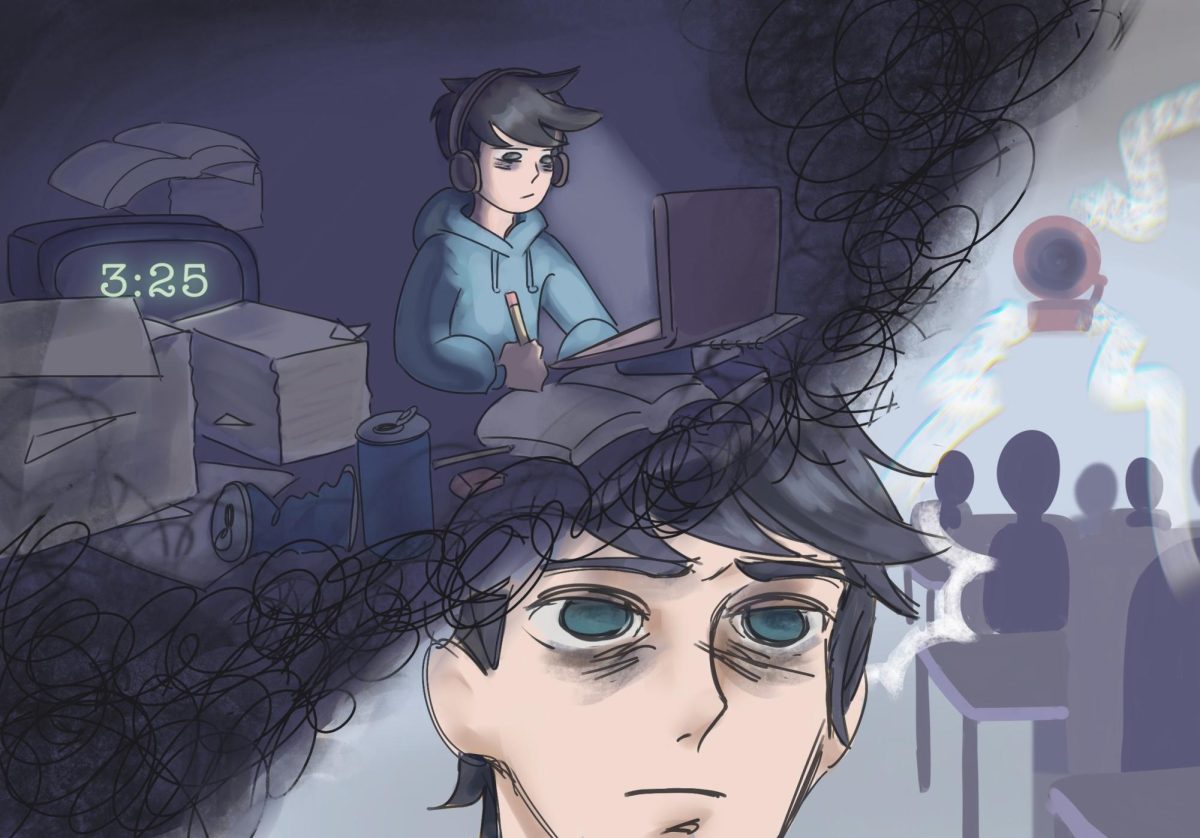In the back corner of the classroom, a student slumps forward in their chair, their eyelids fluttering shut for a moment before they catch themself and snap to attention. The seconds on the clock tick by excruciatingly slowly. Fatigue begins to cloud their vision and their head droops as the heaviness in their body drags them into a fitful sleep ended by the startling chime of the bell.
76.5% of a group of 7,705 high school participants in a study by the Centers for Disease Control and Prevention (CDC) in 2021, slept for less than the recommended minimum of eight hours per night. These students were more likely to experience difficulties with their schoolwork and mental health, and the prevalence of sleep deprivation among this group continues to increase, according to data collected by the CDC from 2009 to 2019, which showed a 10% growth.
At Harker, the hustle mindset and pressure to succeed aggrandize the problem. Two-thirds of the Harker population does not obtain adequate sleep, as revealed by a time management survey sent out to students by upper school academic life coach Jenny Achten at the beginning of the school year. While a majority of students sleep six to seven hours per night, one in five students does not meet this amount.
“Students who get in the habit of staying up very late or starting their homework every night at 10 p.m. are exhausted while they’re doing their homework, so it’s harder to do well,” Achten said. “Then they end up tired the next day, so it’s harder to absorb material and then they end up with more homework because they didn’t get as much done during the day. That chronic cycle is what’s really bad for students’ health.”
This problem is widespread across all grade levels and can extend past high school as well. Its consequences grow deeper if students are unable to develop productive study habits. While many students are forced to sacrifice rest in favor of an impressive academic and extracurricular resume, sleep deprivation increases the risk of a myriad of negative consequences.
Sleeping for less than seven hours a day has been directly linked to damage to many of the body’s vital systems. Upper school psychology teacher Dr. Julie Turchin emphasizes the critical nature of sleep on preventing long-term health risks.
“[Sleep] helps with repairing your body,” Dr. Turchin said. “Your body grows at night, it heals at night. There’s some research that suggests that when you’re sleeping, your brain cells get further apart and more liquid, and they flush out toxins that can lead to things like Alzheimer’s later in life.”
A well-rested body is crucial to not only physical health but also mental well-being. The emotion-regulating center of the brain, known as the prefrontal cortex, takes the most energy out of all the parts of the brain to function. Thus, when students consistently lack sleep, that part of the brain is unable to perform its necessary functions, resulting in mood swings and reckless decision-making.
“Sleep seems to be important for learning and problem solving and creativity and also emotion regulation,” Dr. Turchin said. “When you’re more tired things are just more irritating. You’re already challenged by a brain that sends signals to your limbic system, which is your emotion center, faster than it sends it to your prefrontal cortex. But, when you’re sleep deprived, all of those signals get even harder to work.”
Sophomore Audrey Yang (10) noticed the effect of sleep deprivation on her other habits as well, with her inability to focus on school work leading to a dependency on coffee. She reported only getting a maximum of six hours of sleep on a school night, which forced her to turn to caffeine to provide her with enough energy to get through the day.
“I live off of coffee,” Audrey said. “I started drinking coffee at the beginning of ninth grade, and I drank it around once a week. That made me stay up really late because I was so energized, and so the next day I was even more tired. Now I get coffee at least three times a week.”
Senior Cynthia Wang (12) also struggles to get adequate sleep every night, with distractions such as social media and extracurricular activities stealing precious resting time from her nights. She quickly noticed the effects of staying up late, as she began to depend on napping in the afternoon in order to have enough energy to finish her schoolwork later.
“I get six hours of sleep on a good night, but I’m not happy with this amount because I usually nap from 6 p.m. to 9 p.m. every day, and then I can’t fall asleep until 1 a.m.,” Cynthia said.
Because of the potential to throw off the body’s natural circadian rhythm, upper school academic counselor Hui-Hui Chang discourages students from taking naps. While she acknowledges that napping can be necessary if students are severely deprived of rest, they can feed into the harmful cycle by making it difficult to fall asleep later at night. Instead, Chang suggests students take some time to decompress or destress during the day if they are feeling tired.
“I really caution against napping,” Chang said. “At the end of the day, hopefully students are getting quality and quantity of sleep, so they’re not needing to nap. I don’t hate naps. Naps are just wonderful, but at the same time, they can really mess up sleep. Then that’s that cycle again, that leads to sleep deprivation.”
Although most students hear from teachers and counselors time and again about the importance of sleep and the potential risks of sleep deprivation, the intense focus on high GPAs and padded college resumés motivates students to ignore these cautions. Achten adds that accomplishment cannot be measured by a high school transcript. Instead of stretching themselves to the breaking point by attempting to participate in every opportunity, she encourages students to aim for a balanced lifestyle that prioritizes their own well-being.
“Ultimately, your success in life will depend more on having good, in-depth, well-rounded experiences as opposed to saying, ‘I was in ten clubs, and I played three sports, and I also took nine APs and, and, and, and…,’” Achten said. “That huge resume list will not serve you as well as having a healthy high school experience.”
However small it may be, whether by building new habits or making little adjustments to their current schedule, students can break out of this cycle of chronic sleep deprivation. Chang recognizes that finding time for oneself and reevaluating one’s choices is difficult. She highlights the importance of self-compassion, especially when students are feeling overwhelmed by schoolwork or anxious about extracurricular activities.
“Be kind to yourself,” Chang said. “Change takes time, and having to adjust and be realistic with yourself. Having good time management within academics is going to play into the sleep that we get. If we are prioritizing sleep, we know that we [have to] get this stuff done, and then we can see if this is realistic to fit within the four hours I have to do homework. If it’s not, we have to make a change.”


















![“[Building nerf blasters] became this outlet of creativity for me that hasn't been matched by anything else. The process [of] making a build complete to your desire is such a painstakingly difficult process, but I've had to learn from [the skills needed from] soldering to proper painting. There's so many different options for everything, if you think about it, it exists. The best part is [that] if it doesn't exist, you can build it yourself," Ishaan Parate said.](https://harkeraquila.com/wp-content/uploads/2022/08/DSC_8149-900x604.jpg)




![“When I came into high school, I was ready to be a follower. But DECA was a game changer for me. It helped me overcome my fear of public speaking, and it's played such a major role in who I've become today. To be able to successfully lead a chapter of 150 students, an officer team and be one of the upperclassmen I once really admired is something I'm [really] proud of,” Anvitha Tummala ('21) said.](https://harkeraquila.com/wp-content/uploads/2021/07/Screen-Shot-2021-07-25-at-9.50.05-AM-900x594.png)







![“I think getting up in the morning and having a sense of purpose [is exciting]. I think without a certain amount of drive, life is kind of obsolete and mundane, and I think having that every single day is what makes each day unique and kind of makes life exciting,” Neymika Jain (12) said.](https://harkeraquila.com/wp-content/uploads/2017/06/Screen-Shot-2017-06-03-at-4.54.16-PM.png)








![“My slogan is ‘slow feet, don’t eat, and I’m hungry.’ You need to run fast to get where you are–you aren't going to get those championships if you aren't fast,” Angel Cervantes (12) said. “I want to do well in school on my tests and in track and win championships for my team. I live by that, [and] I can do that anywhere: in the classroom or on the field.”](https://harkeraquila.com/wp-content/uploads/2018/06/DSC5146-900x601.jpg)
![“[Volleyball has] taught me how to fall correctly, and another thing it taught is that you don’t have to be the best at something to be good at it. If you just hit the ball in a smart way, then it still scores points and you’re good at it. You could be a background player and still make a much bigger impact on the team than you would think,” Anya Gert (’20) said.](https://harkeraquila.com/wp-content/uploads/2020/06/AnnaGert_JinTuan_HoHPhotoEdited-600x900.jpeg)

![“I'm not nearly there yet, but [my confidence has] definitely been getting better since I was pretty shy and timid coming into Harker my freshman year. I know that there's a lot of people that are really confident in what they do, and I really admire them. Everyone's so driven and that has really pushed me to kind of try to find my own place in high school and be more confident,” Alyssa Huang (’20) said.](https://harkeraquila.com/wp-content/uploads/2020/06/AlyssaHuang_EmilyChen_HoHPhoto-900x749.jpeg)





